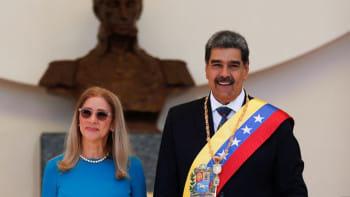Fear and joy after Trump victory

November 8 was a sunny and warm autumn day as New Yorkers went out to their local poll sites to vote for their country's future leader.
That night, Donald Trump won a decisive victory for presidency. Media outlets are still discussing the unprecedented voter turnout in White suburban counties in each state which led to the Republican's election. Although it was a great night for Trump, it is a worst-case scenario for others.
With pollsters convinced that this election was in favour of Hillary Clinton, many Bangladeshis were confident in the Democrat's ability to win the presidential race. Two university students, Fahim and Faysal were hanging around in Jackson Heights, Queens on Election Day and were positive that Clinton would take the presidency.
“Hillary has the most possible chance to win because she is the most reasonable person to run this country,” Fahim said thoughtfully.
Faysul agreed with his friend, pointing out that Clinton has experience in politics but that “thinking about the US' economy, Trump is better.”
A Bangladeshi American woman on her way to cast her vote in the last hours of the evening on Election Day, replied with a smile, “Hillary will win. I'll be the happiest person if she wins. Trump said nasty things about women and that ruined his chances.”
Later that night, it became apparent that Clinton's chance of winning was slipping away, as Trump won over many swing states. New York City awoke to a gray and rainy morning and to the news that Donald Trump is now President Trump.
Many Bangladeshi Americans are upset with the results of the 2016 election. Ayesha Siddique, a development coordinator for the Girl Scouts of the USA, expressed her disdain with sarcasm in her voice, “A lot of people who feel left out by the multicultural direction the country is going in, have expressed their views this election.
“America isn't the only place where far right movements have become a problem. It's a global problem. I think there are a lot of disgruntled people that don't feel at home. There's a lot of racism and sexism that's gone undiagnosed.”
She said she was frightened by the prospect of a Trump presidency but quickly reasoned, “I think that progressives have to mobilise. America is still not a dictatorship, it's still a democracy. Progressives have to have their voices heard continually.”
When a university student in Queens, New York was asked what he would do when Trump is president, he stared off into the distance. He muttered under his breath “not sure”. He was unable to imagine a Trump presidency as a reality, one that had just taken place.
Subrata Podder, a 29-year-old Bangladeshi American, was not agonising over Trump's win, however.
“There is no problem with who wins the presidential election,” he said while smiling. “Everyone wants someone who can do good for everybody who lives in the USA. Those who are here illegally wanted Hillary to win because she promised that she would take care of illegal immigrants.
“Bangladeshis, even people from Iraq, were scared that they had to leave America. You'll see in the news today that so many people google searched if it was possible to migrate from here to Canada. If Trump can make policies to help illegal immigrants here, then there will be no problem.”
Trump's victory has left half of America in fear and the other overjoyed. Bangladeshis must now play a waiting game to find out what kind of a leader they will stay stuck with for the next four years.

 For all latest news, follow The Daily Star's Google News channel.
For all latest news, follow The Daily Star's Google News channel. 



Comments